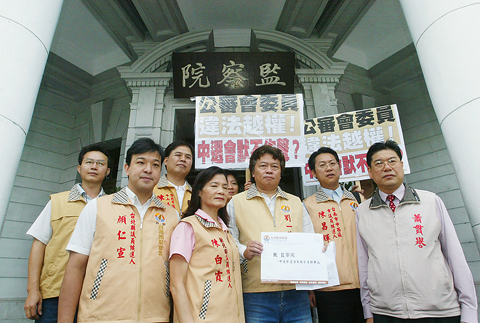In a petition to the Control Yuan yesterday, the Taiwan Solidarity Union (TSU) accused the Referendum Review Committee of exceeding its authority by rejecting the party’s referendum proposal on the government’s planned cross-strait trade pact.
“We hope the Control Yuan members will favor the side of justice and punish members of the Referendum Review Committee who violated the Constitution and deprived people of the right to hold a referendum,” TSU Secretary-General Lin Chih-chia (林志嘉) said yesterday.
On June 3 the Referendum Review Committee rejected a TSU referendum initiative that would have asked voters: “Do you agree that the government should sign an economic cooperative framework agreement [ECFA] with China?”

PHOTO: CNA
The committee said “the referendum question’s content and purpose were contradictory” and hence invalid under Article 14, Section 1.4 of the Referendum Act’ (公民投票法).
The act states that referendum questions must not have a “contradiction or obvious error in the content of the proposal, thus making the intention of the proposal not understandable.”
Rebutting the ruling, the TSU on June 6 showed a letter dated May 5 from the Central Elections Commission (CEC) to TSU Chairperson Huang Kun-huei (黃昆輝) that said a CEC meeting held a day earlier did not find a conflict between the referendum proposal and any parts of Article 14, Section 1 of the act.
Citing the act’s Article 3 that stipulates the Executive Yuan as the governing body of the Referendum Act and a public notice by the Executive Yuan with the serial number 0930083141-A that said the CEC is commissioned by the Executive Yuan to handle affairs in connection with the act, the TSU argues the CEC has the authority to process decisions on all parts of Article 14.
TSU Deputy Secretary-General Liu Yi-teh (劉一德) yesterday said the Control Yuan should punish CEC officials for not even trying to defend their authority.
“It was obvious that the members of the Referendum Review Committee had exceeded their powers but CEC officials didn’t say a word,” Liu said. “It was negligence of duty and it impaired the rights of the public.”
The petition was received by Control Yuan member Shen Mei-chen (沈美真).
In related news, an opinion poll released by the Democratic Progressive Party (DPP) yesterday suggested most Taiwanese harbor doubts over the ECFA.
DPP poll center director Chen Chun-lin (陳俊麟) told a press conference that the poll found 47 percent of respondents who indicated they favor the pan-green camp said there is no hurry to sign the treaty while 45 percent said they were against signing the pact.
While the poll showed 44 percent of people who indicated they favor the pan-blue camp said they supported signing the pact as soon as possible, it also found that another 44 percent said they see no urgency to sign the pact now.
The poll showed that 50 percent of people who indicated they had no political affiliation believed there was no need to rush to sign the pact now, while 17 percent said they were against the proposal, with 12 percent in favor.
The poll also showed that nearly 50 percent of respondents agreed that while an ECFA would bring Taiwan short-term benefits, they believed it would jeopardize Taiwan’s interests in the long-run, with 39 percent disagreeing.
The poll, held on Monday, sampled 1,093 voters aged 20 and over. The poll has an overall margin of error of 3.02 percent.

Alain Robert, known as the "French Spider-Man," praised Alex Honnold as exceptionally well-prepared after the US climber completed a free solo ascent of Taipei 101 yesterday. Robert said Honnold's ascent of the 508m-tall skyscraper in just more than one-and-a-half hours without using safety ropes or equipment was a remarkable achievement. "This is my life," he said in an interview conducted in French, adding that he liked the feeling of being "on the edge of danger." The 63-year-old Frenchman climbed Taipei 101 using ropes in December 2004, taking about four hours to reach the top. On a one-to-10 scale of difficulty, Robert said Taipei 101

Nipah virus infection is to be officially listed as a category 5 notifiable infectious disease in Taiwan in March, while clinical treatment guidelines are being formulated, the Centers for Disease Control (CDC) said yesterday. With Nipah infections being reported in other countries and considering its relatively high fatality rate, the centers on Jan. 16 announced that it would be listed as a notifiable infectious disease to bolster the nation’s systematic early warning system and increase public awareness, the CDC said. Bangladesh reported four fatal cases last year in separate districts, with three linked to raw date palm sap consumption, CDC Epidemic Intelligence

US climber Alex Honnold left Taiwan this morning a day after completing a free-solo ascent of Taipei 101, a feat that drew cheers from onlookers and gained widespread international attention. Honnold yesterday scaled the 101-story skyscraper without a rope or safety harness. The climb — the highest urban free-solo ascent ever attempted — took just more than 90 minutes and was streamed live on Netflix. It was covered by major international news outlets including CNN, the New York Times, the Guardian and the Wall Street Journal. As Honnold prepared to leave Taiwan today, he attracted a crowd when he and his wife, Sanni,

Taiwanese and US defense groups are collaborating to introduce deployable, semi-autonomous manufacturing systems for drones and components in a boost to the nation’s supply chain resilience. Taiwan’s G-Tech Optroelectronics Corp subsidiary GTOC and the US’ Aerkomm Inc on Friday announced an agreement with fellow US-based Firestorm Lab to adopt the latter’s xCell, a technology featuring 3D printers fitted in 6.1m container units. The systems enable aerial platforms and parts to be produced in high volumes from dispersed nodes capable of rapid redeployment, to minimize the risk of enemy strikes and to meet field requirements, they said. Firestorm chief technology officer Ian Muceus said